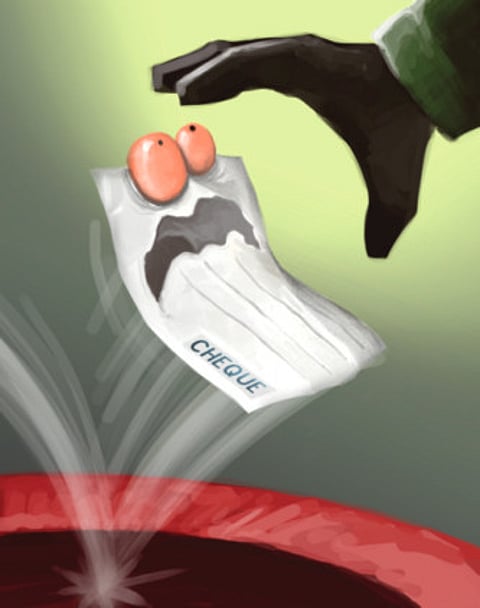Bad cheques are still a crime in the UAE
The media has got hyped up in the past few days with a UAE government order, but the matter is not as it seems to be on the surface.

The media has got hyped up in the past few days with news that the UAE government has issued an order to the effect that issuing bounced cheques was no longer a criminal offence. No one cared to check, however, how such an “order” would change the prevailing law of the country in light that issuing a bounced cheque is deemed a punishable criminal act in accordance with the UAE Penal Code.
It is true that an order was issued stating that bounced cheques that are issued as loan collateral will no longer constitute a criminal action and that the Police Force will not entertain claims relating to such cheques. The UAE Courts will equally end proceedings relating to such cheques as a result of this order.
However, the matter is not as it seems to be on the surface. The order issued in this respect is very limited in nature. Firstly, the order is limited to cheques issued as collateral. Therefore, cheques that are issued for payment will not fall under the order. Secondly, the order applies only to cheques issued by UAE Nationals and hence other nationalities will not be able to avail from the order. Thirdly, and most importantly, the order relates only to cheques issued by UAE Nationals whose cases are being dealt with by The Higher Committee for Debt Settlement Fund. Thus, not even all UAE Nationals will be able to benefit from this order. In reality, nothing has therefore changed with regards to the practice of criminalizing the issuance of bounced cheques.
It is an undisputed fact that the long standing practice of criminalizing bounced cheques has received wide criticism over the years. Prominent businessmen who genuinely faced financial issues saw the situation worsen by the fact that they were charged with criminal actions for what were civil and commercial transactions. They had to ultimately face jail sentences or were forced to leave the country, leaving behind them debts that they may have otherwise been able to settle had they not been forced to flee.
Law enforcement authorities have been complaining that dealing with the volume of crimes arising from bounced cheques is draining their resources, forcing them to act as debt collectors for those who make bad commercial decisions, which is essentially a civil debt.
Even top government authorities have been complaining about the situation, as the governmentevery once in while has to come forward to bail out UAE nationals who end up behind bars as a result of issuing bad cheques. The government considers itself obliged to do so in order to preserve the social fabric of the UAE by supporting local families who are left with no financial support becausethe head of the family is in prison.
Many lawyers and scholars also criticize the practice as being out of date and non-conformant with modern legislative trends that treat cheques as civil and commercial debts. Under the modern systems, there is no criminal punishment for issuing a cheque that subsequently bounces as criminal punishment is restricted to criminal and not civil actions.
If that is the case then the question which poses itself is why the UAE would continue to insist on criminalizing bounced cheques. In my opinion, this is a practice that has been in existence for decades and is so deeply rooted in business practice in the UAE that it becomes difficult to change and there are interest groups that lobby for the continuance of this practice. Banks and real estate owners are also on the front linesin supporting this practice as it provides them with an easy way to collect their debts and rents whilst saving on costly and time consuming litigation.
It is my view that we will not see any change in the legislative approach to the issue of bounced cheques until we come up with an alternative business solution that is acceptable to banks and property owners. Or until the judiciary is reformed to provide an expedite and cost effective mechanism to banking and rent related cases.
Dr Habib Al Mulla is one of the UAE’s most highly respected legal authorities. He has over 27 years’ experience in UAE law and has drafted many of the modern legislative structures in place in Dubai today. Dr Habib is a strong advocate for the improvement and modernisation of UAE Laws. He is a frequent commentator on the legislation and economy of the UAE and is often consulted to draft and advise on Federal and Emirate level laws.
Sign up for the Daily Briefing
Get the latest news and updates straight to your inbox



